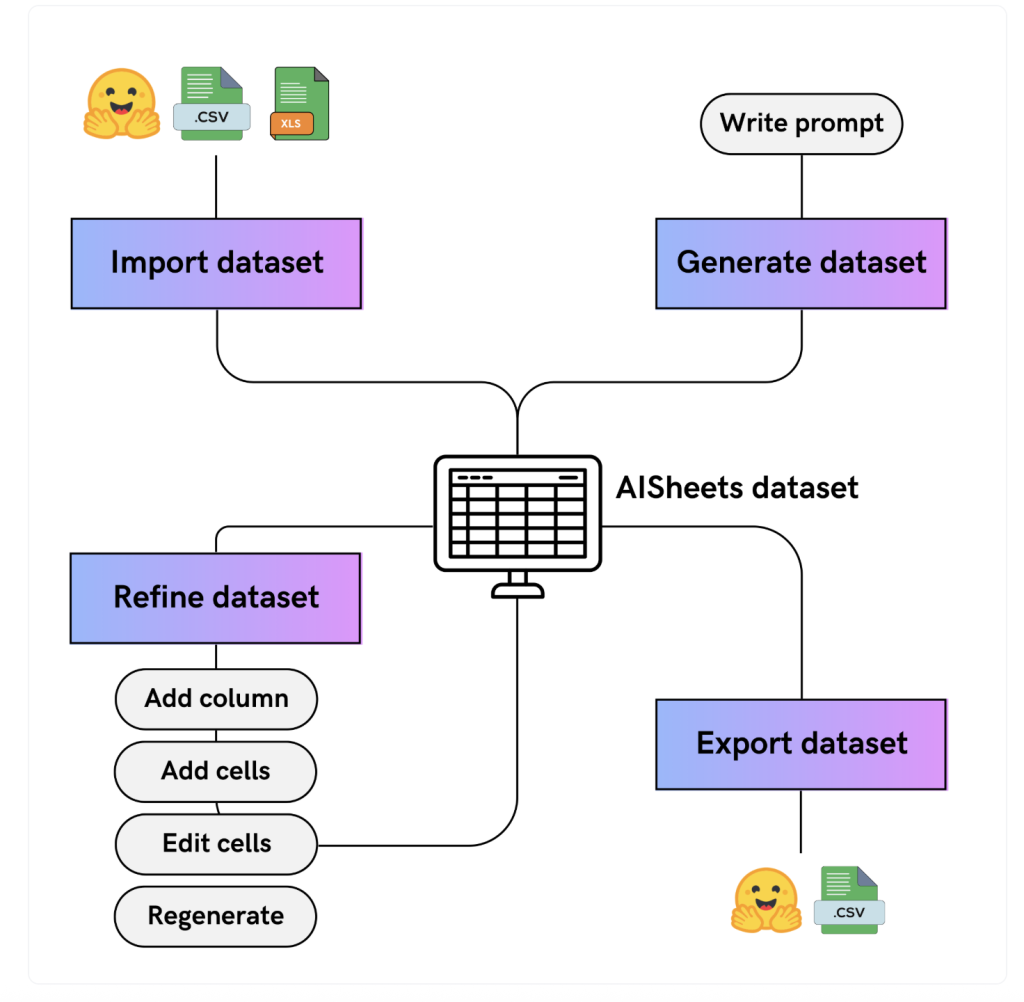Embrace the Face Unveils AI Paper: Free, open source codeless toolkit for LLM-driven datasets
Hug face just released AI tableThis is a free, open source and local number one code-free tool designed to fundamentally simplify dataset creation and use of AI. AI Tables aim to democratize access to AI-driven data processing by combining intuitive spreadsheet interfaces with direct access to Qwen, Kimi, Llama 3, etc. with leading open source large language models (LLM).
What is an AI table?
AI tables are spreadsheet format data tools used to use data sets and leverage AI models. Unlike traditional spreadsheets, integrated AI models can be used to power and enrich each cell or column in an AI table through natural language cues. Users can: Development +3
- Build, clean, transform and enrich datasets directly in the browser or through a local deployment.
- Apply open source models by embracing the Face Hub app, or running your own native custom models (as long as they support OpenAI API specifications).
- Quickly prototyping data by editing and validating cells, fine-tuning AI output, and running a large-scale data generation pipeline.
Key Features
- No code workflow: Users interact with an intuitive spreadsheet UI and apply AI transformations using prompts (no Python or required encoding required).
- Model Integration: Access thousands of models right away, including the popular LLM (Qwen, Kimi, Llama 3, etc.). Support on-premises deployments with servers like Ollama, enabling you to use fine-tuning or domain-specific models with zero cloud dependencies.
- Data Privacy: When running locally, all data is retained on your machine to meet security and compliance needs.
- Open source and free: Both hosted and local versions are available at zero cost, supporting an open AI community and customization.
- Flexible deployment: Run completely within the browser (via the embrace of facial space), or run locally for maximum privacy, performance and infrastructure control.
How it works
- Timely driven columns: Create new columns by entering plain text prompts, allowing the model to generate or enrich data.
- Local models support: Set environment variables (
MODEL_ENDPOINT_URLandMODEL_ENDPOINT_NAME) To seamlessly connect the AI board with your local inference server (e.g., Ollama loading Llama 3), it is compatible with the OpenAi API. - Use cases: AI tables support tasks such as sentiment analysis, data classification, text generation, fast dataset richness, and even batch processing in large-scale datasets, including in collaborative, visual environments.

Influence
AI boards greatly reduce technical barriers to advanced dataset preparation and enrichment. Data scientists can experiment faster, analysts get powerful automation, and non-technical users can leverage AI without any coding. By combining the open source model ecosystem of embracing the surface with a code-free interface, AI tables can become an important tool for practitioners, researchers and teams seeking flexible, private and scalable AI data solutions.
Supported LLM
- QWEN
- Kimi
- Camel 3
- Openai’s GPT-oss (via inference provider)
- Any custom model that supports OpenAI API specifications
getting Started
- Try the browser: The embracing facial space has an AI table for instant use.
- Local deployment: Clones from github (
huggingface/aisheets), set up inference endpoints, and run in the infrastructure for privacy and speed. - document: GitHub Read Files and Hug Faces Blog provides step-by-step setup instructions and sample workflows for cloud and on-premises deployments.
Anyway
Hugging Face AI Tables is a free, open source and native code-free solution that can use leading open source AI models to build, enrich and transform datasets and seamlessly support custom on-premises deployments, making advanced AI easy to access and collaborate.
Check github repo, try and do technical details here. Check out ours anytime Tutorials, codes and notebooks for github pages. Also, please stay tuned for us twitter And don’t forget to join us 100K+ ml reddit And subscribe Our newsletter.

Michal Sutter is a data science professional with a master’s degree in data science from the University of Padua. With a solid foundation in statistical analysis, machine learning, and data engineering, Michal excels in transforming complex data sets into actionable insights.


